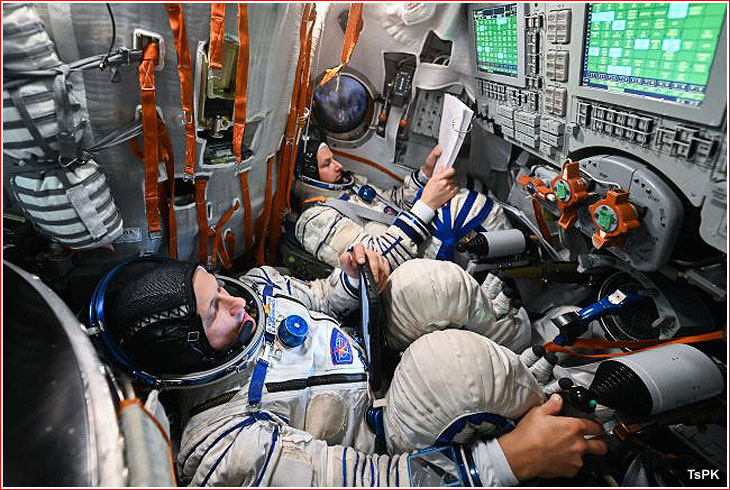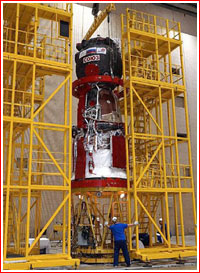Roskosmos swaps ships for the Soyuz MS-28 mission
The early in the launch campaign for Expedition 74 to the International Space Station, ISS, program managers had to replace the Soyuz vehicle originally assigned to the flight, likely due to the damage inflicted on the ship’s critical thermal shield during a botched test.

Sergei Kud’-Sverchkov and Sergei Mikaev practice inside the Soyuz simulator for the upcoming ISS mission, scheduled for launch in November 2025.
Soyuz MS-28 mission at a glance:
Spacecraft designation
Soyuz MS-28 (11F732 No. 753), ISS mission 74S
Launch vehicle
Soyuz-2-1a 14S53 No. K15000
Payload fairing
(SZB) 11S517A3.1000A1-0 No. K15000
Spacecraft mass
~7,152 kilograms
Launch Site
Baikonur, Site 31, Pad No. 6
Launch date and time
2025 Nov. 27
Docking date and time
2025 Nov.
Docking destination
ISS, Russia Segment
Flight duration (planned)
~8 months
Landing date
2025 July
Primary crew
Sergei Kud’-Sverchkov, Sergei Mikaev, Christopher Williams
Backup crew
Petr Dubrov, Anna Kikina
The Soyuz MS-28 spacecraft, carrying two Russian cosmonauts and a US astronaut to the International Space Station, ISS, was set for launch from Cosmodrome Baikonur in Kazakhstan on Nov. 27, 2025.
On Aug. 21, 2024, Roskosmos announced that Russian cosmonauts Sergei Kud’-Sverchkov, Sergei Mikaev and Oleg Platonov had been assigned to the Soyuz MS-28 crew. Around that time, the launch of Soyuz MS-28 was expected on Oct. 25, 2025, but before the end of 2024, the mission shifted to Nov. 27, 2025. By early 2025, NASA astronaut Christopher Williams replaced Platonov in the Soyuz MS-28 crew based on the third extension of the agreement on the ISS exchange flights between the US space agency and Roskosmos.
The mission was originally supposed to use Soyuz-MS vehicle No. 759, which was the next on the assembly line at RKK Energia’s ZEM factory in Korolev, near Moscow.
However, during routine post-production tests at ZEM’s Checkout and Test Facility, KIS, Vehicle No. 759 reportedly suffered major damage to its thermal protection system, which could not be repaired in time for the Expedition 74 launch at the end of 2025. According to one source, quoting an officer within the military certification service, Voennaya Priemka, which traditionally oversees quality control in the Russian rocket and space industry, the ship’s main thermal control heat shield, attached to the base of the Descent Module, SA, (INSIDER CONTENT) was accidentally jettisoned, perhaps by a stray signal triggering the pyrotechnic bolts, connecting the Frisbee-shaped structure to the capsule. According to another source, the thermal layers of the shield peeled off, as a result of botched thermal tests.
In any case, as of late October 2025, neither Roskosmos nor the official media had confirmed the fact of an incident, but the photos of the Soyuz MS-28 spacecraft undergoing processing in Baikonur, which accompanied press-releases about the launch campaign, showed No. 753 on the flight-worthy ship.
That particular Soyuz-MS, along with Vehicle No. 752, was initially reserved for “tourist” missions, but after the last hopes for commercialization of the Russian space flight had evaporated due to the quagmire in Ukraine, Roskosmos was free to press Vehicle No. 753 back into routine service for the ISS. The incident with Vehicle No. 759 provided an opportunity to use the mothballed ship, before some of its critical systems would go beyond warranty.
Launch campaign in Baikonur
The active preparations for launch started in Baikonur in early October 2025, when specialists completed the testing of the Kurs-NA rendezvous system in the anechoic facility of the Spacecraft Processing Building at Site 254 in Baikonur. Around Oct. 22, 2025, the spacecraft was placed into the vacuum chamber for a nearly week-long search for potential air leaks. The tests were declared completed on October 27, when the vehicle was returned back to its processing site for tests of the propulsion system automatics (INSIDER CONTENT), flight control computers, radio systems and the loading of cooling fluid into the manifolds of the thermal control system (INSIDER CONTENT).
In the meantime, the Soyuz-2-1a launch vehicle and payload fairing for the mission were reported arriving by rail at Site 112 in Baikonur on Oct. 22, 2025.
Soyuz MS-28 crew members:
Soyuz commander (Roskosmos)
Sergei Kud’-Sverchkov
Petr Dubrov
Flight engineer 1 (Roskosmos)
Sergei Mikaev
Anna Kikina
Flight engineer 2 (NASA)
Christopher Williams


